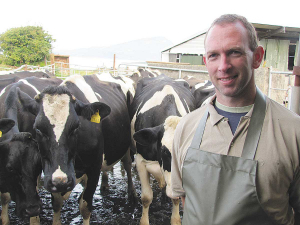The politics of climate change
OPINION: The Financial Times, a major international newspaper, featured New Zealand on its front page at the beginning of June. It wasn't for the right reasons.
 Currently, the Irish agriculture sector accounts for 34% of that country's total greenhouse gas emissions.
Currently, the Irish agriculture sector accounts for 34% of that country's total greenhouse gas emissions.
Irish farmers are facing similar concerns to their NZ counterparts about how they can reduce the agriculture sector's greenhouse gas (GHG) contributions without severely restricting their future production and profitability.
The Irish Farmers Journal reports that "massive cuts" to Ireland's cattle herd are on the cards unless alternatives can be found to agriculture's contribution to that country's GHG emissions. The paper says Ireland's new Climate Bill - published late last month - aims to reduce the country's GHG levels to net zero by 2030.
Ireland's 51% target of reductions in GHGs by 2030, means the country's farming sector is facing significant challenges. Currently, the Irish agriculture sector accounts for 34% of the country's total emissions.
The paper says that unless new technologies are found or emissions calculations introduced, hugely reducing the number of livestock in the country will be the deciding factor in meeting the new targets for the agriculture sector.
Specific GHG reduction targets for each sector of the Irish economy - including agriculture - are expected to be set by the Climate Change advisory Council and Government in the next few months.
The Journal reports that the council had previously suggested that up to 53% of the country's suckler herd - some 536,000 cattle - would have to be culled from the national herd by 2030 to meet the emissions target. However, it also has promoted the idea of more forestry and improved fertiliser use as possible solutions as well.
However, at the moment, the reality for the Irish farm sector is that withouth new technologies the Climate Bill means an end to increasing herd sizes and a big reduction in cattle numbers.
Environment Minister Eamon Ryan highlighted, at the launch of the bill, the importance of biodiversity. He promised farmers they would be "paid properly for looking after nature."
The Irish farm sector says the next decade will be crucial in shaping how future generations will farm in Ireland. It is now waiting on how Agriculture Minister Charlie McConalogue responds to the targets and what support he will offer farmers to meet them.
Global trade has been thrown into another bout of uncertainty following the overnight ruling by US Supreme Court, striking down President Donald Trump's decision to impose additional tariffs on trading partners.
Controls on the movement of fruit and vegetables in the Auckland suburb of Mt Roskill have been lifted.
Fonterra farmer shareholders and unit holders are in line for another payment in April.
Farmers are being encouraged to take a closer look at the refrigerants running inside their on-farm systems, as international and domestic pressure continues to build on high global warming potential (GWP) 400-series refrigerants.
As expected, Fonterra has lifted its 2025-26 forecast farmgate milk price mid-point to $9.50/kgMS.
Bovonic says a return on investment study has found its automated mastitis detection technology, QuadSense, is delivering financial, labour, and animal-health benefits on New Zealand dairy farms worth an estimated $29,547 per season.

OPINION: Here w go: the election date is set for November 7 and the politicians are out of the gate…
OPINION: ECan data was released a few days ago showing Canterbury farmers have made “giant strides on environmental performance”.